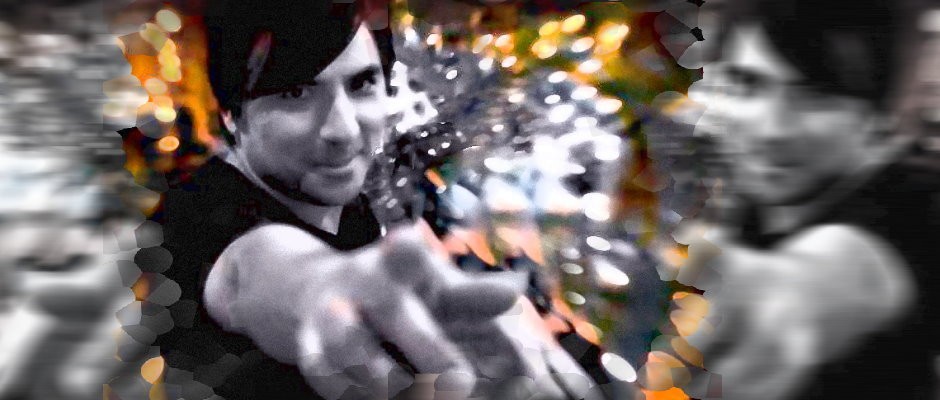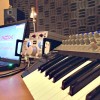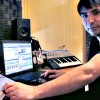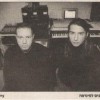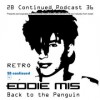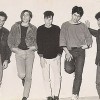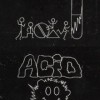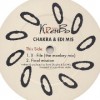Eddie Mis – a visionary and an innovative LEGEND – DJ, has marked his sound and changed the electronic music scene as no one (ever) done before. He was the resident DJ at the Penguin club in 1986; the first Industrial Electronic New Wave club in Tel- Aviv. While he was moving foreword, Eddie created the first line of Acid House music in Tel-Aviv at the early 90s and opened the door for new horizons. These days he is still developing his sound and searching for new directions, working on his album, a few new releases will be drop on the market in fall/winter 2012.
Q: Tell us about your childhood – where you grew up and the music that you absorbed.
Eddie: I was born and raised in Bucharest, Romania until the age of six, and ever since I can remember I had a tape recorder in the room with my aunt’s audio tape cassette collection. About the age of four I already knew how to replace the tape cassette and I was always coming back to those tapes with strange symbols on them. At age five I learned to read and I figured out what it was that I played in a loop all this time, these were tapes of ABBA and Boney-M.
Q: When was your first experience with vinyl records and who were your favorite artists?
Eddie: When my family got to Israel in 1974, my father bought a new stereo and the party started for me, every day after I returned from school, I was testing the records that my father would buy for the weekend and luckily he was buying vinyls almost every weekend.
After experimenting some time with his record collection, I realized that I liked most of the music genres in my father music collection… but some vinyls caught my ear even more than others. I still remember Deep Purple, Led Zeppelin, Iron Maiden and White Snake. On the other hand I had the Stars on 45 and several disco collections. I had a lot of fun listening to euphoric new Disco, especially after a hard-rock melodrama, I would end the daily jam with Grace Jones, The Police or Dillinger. For me music is, and always was a kind of magic. The music always managed to influence me and change my mood for the better.
At some point I found the record store, Paz at Masaryk Square and the musical treasures of the early eighties started coming up to me. I always explored to try to find new kinds of music to take home to find out its influence on me. When I think about the New Wave music of the early 80s, one of the bands that influenced me the most was Kraftwerk and then came John Foxx, the early Cabaret Voltaire, Chris & Cosey and many others.
Q: How did your connection to the Penguin club start?
Eddie: Around the age of 16, in 1984, I arrived at the Penguin club in Tel Aviv and fell in love with the club and the people there. Some of the music that was played there I already had in my collection but some was new to me and came in full blast.
Q: What happened next?
Eddie: Over time I made new friends there (Gal Orstein, and Avi Nissim). New ideas started to come up and one of them was to form a band. We didn’t really have the money to buy new musical equipment. With the influence of the industrial bands at the time, I brought the idea to take different sizes of cans and fill them with iron rods and used as a percussion instrument, the idea was welcomed and a new band Giant Gosh was established.
In a very short time I realized that I wanted a synthesizer. I saved some money and went to the flea market and found an old Jam, or Jen 70s Synthesizer (Italian company) that was a strange combination of half organ and half Synthesizer, I was able to control the envelope and some other parameters. To this day I think the synth was a bit broken because the sound had changed suddenly and started making noises like a refrigerator. The band members were excited and said it adds some atmosphere to the music, and I sadly agree with them.
Eddie: After several performances of Giant Gosh at the Penguin club, the owner Adi Milstein saw that we brought in a lot people to our shows and he offered us a weekly events on Tuesdays nights, The event was Avantgarde, with very experimental, industrial, and atmospheric music like Chris & Cosey, Throbbing Gristle, Cabaret Voltaire, Tuxedomoon, PsychicTV, Coil, Virgin Prunes, Einstürzende Neubauten, Test Dept, Foetus, SPK, D.A.F, Fad Gadget, Anne Clark, Front 242, Skinny Puppy, Severed Heads, Libach, Revolting Cocks, KMFDM, Ministry, Mark Stuart and many others.
Two months later, Adi as the club owner asked me to start Djing on Friday nights, I was glad to combine all of my atmospheric music of Tuesdays nights with Friday hits and this how the Penguin dark style music as known today was born.
To be the resident DJ at Penguin on Friday night was great… but I already started looking for the next musical revolution.

Q: What was this musical revolution and how was it prompted in Israel?
Eddie: In ’88 I got the new Psychic TV – Tune In (Turn on the Acid House) at the local record shop (Beit Hataklit @ Pinsker Street). Thenew Psychic TV music direction was great, I started searching for more psychedelic TB lines with the Soft Cell disco grooves, I found some Chicago House to mix in… and looks like a new music revolution just kicked in, called Acid House. I tried my new mix on Friday night at the Penguin and saw that it works great on the dance floor, but it didn’t particularly get along with the other melancholic music of the Friday night at the Penguin. I decided to create a new music experience on Wednesday nights at the Penguin club, with Chicago House 303 bass-line mixed with the U.K Acid House… and of course I called it Acid House night : )
At the Penguin we bought a huge swath of black fabric material. I drew a lot of yellow Smileys in different sizes, as well for local staff I printed black shirts with yellow smileys with exploding brains, also the invitations for the event were designed accordingly. We invited a different range of audience and the event was a meteoric success; within three months another three events were running at the Penguin club.
One of them was called Pyramid nights (gay audience). At one point all the city DJs wanted to spin acid house at the Penguin club. Dj Choopie from the Shiroco club came and shared his skills, Eitan Tabor, (RIP), the legendary DJ from the first Liquid club @ Karlibach St. That hit the Penguin dance floor with his acid house music collection. We also had the honor of hosting DJ Liron Thani, who traveled to London specifically to collect records for his set at the Acid House night at the Penguin club.
Q: How did Acid House affect you?
Eddie: The Acid House music influenced me in every area of thinking and feeling. By looking at the happy audience on the dance floor and seeing this huge freedom on its mind and moving to these hypnotic beats made me feel that electronic music can speak to everyone in the same language. I began to invest more in building my home studio which was almost impossible and very expensive at the time for me. It took me several years to buy and pick up good equipment, but it didn’t bother me to continue producing and performing my music.
Q: Were you accepted by the Israeli record labels?
Eddie: I tried to publish the music I created. At first I was going to the record companies in Israel and gave them my demo cassettes, I felt contempt for their part, but I knew it was due the lack of knowledge of what is happening in the international dance music market. At some point I gave up the idea of working with record companies in Israel and I decided to send a demo of my music overseas to record labels that I liked and appreciated. To my surprise, positive responses about my music demo began to arrive.
“Today we have the technology, or at least we think we have, however, sometimes we still lack the full spiritual aspect of body mind, and spirit”
The reason for the rejections of the record companies in Israel was because they did not believe Israeli electronic music without singing in the Hebrew language can sell in the Israeli music market.
After I received international recognition, I came with a CD printed in Germany and showed them that my name appeared on the cover. They straightaway told me they wanted to hear more of my music and they are willing to work with me directly and willing to print and release my music, by saying that “now is the right time”.
Q: What happened to your music career after that?
Eddie: In ’91-’92, I was invited to some free acid parties at the beach, it was even before the trance scene was commercialized. At the same time I started getting tapes of DJs sets from Japan and Goa, I liked some of the tracks in those tapes and found that they mixed well with my own DJ sets.
In’93 I was the first Israeli artist to release his music in the German techno music market. I began working and releasing my music with Trigger and then Labworks and over time my music began to be published and distributed worldwide. The Israeli companies that did not want to work with me before were no longer skeptical and I received offers to work and to open the Israeli market to this new type of music, I worked with Israeli companies such as Phonokol, Hed Arzi, Melodia, and BNE.
In ’93-’94 I also began performing with my new music in places like Cinerama where I performed with Harel Prusky, Nati Mishali, and Shahaf Schwartzman. Twice we blast up the Cinerama with 5000 people, at the time this was considered a great success.
Q: Tell us about the mythological X-File track and its influence on trance music.
Eddie: In ’96 I started working with Rami Shapira (Chakra), whom I knew from the Penguin days, on new music together in my home studio, and we made two tracks. The first one was The Final Mission, which was a great psychedelic Goa track. The second track we did was the X-File (Monkey Mix). We gave both tracks to a few DJs to try them out on the dance floor. On the first weekend the tracks hit the dance floor, friends started calling me with lovely feedbacks… a good friend told me the (X-File) made them cry of happiness in a sunrise outdoor party, and this was without him knowing it was my new music.
The same conclusion started to build up over the next few weeks, the X-file was on completely different level, and to this day the X-file is considered to be one of the most famous tracks ever made in the psychedelic Goa trance. The (X-File) was released in many Goa trance compilations over the last 15 years; as well as dozens of different remixes (official and unofficial) were released, too.
Q: Did you have other projects with Rami Shapira ?
Eddie: We continued our collaboration separately on the album called The Promise Land, which was released on Krembo Records. The album concept is very powerful and touches on many levels of electronic music. To the present day, it’s still considered to be one of the most successful and influential albums in the psychedelic Goa trance scene.
The collaboration with Rami brought a lot of publicity, fame and success. The continued success with the album brought demand for more, but personally and artistically I felt I wasn’t so honest with myself to make our formula into printing machine and to print another dozen of similar albums. After success with the psychedelic trance music, I felt a strong artistic desire for the next personal growth and self-development with my music, and to get the next experience in other areas of the electronic music dimensions.
Q: When you realized that psychedelic trance wasn’t enough for you, how did you expand your career?
Eddie: I wanted to blend my psychedelic vision with another area of the electronic music productions. In 2000 I made Funtech- Play Nice, an artist album in my studio with various artists, in this album I had experimented with singing, recording guitars and other acoustic instruments. The direction of the album was more Downtempo to Lounge but still a satisfying aspect of my psychedelic music. After a while I began to miss the dance floor and started a new project called rEpOp in collaboration with Guy Landen. This project was just about fun minimalistic melodies in a sparkly bliss of the moment.
In 2005 I traveled to the United States and after a few months, I decided to stay in San Francisco, which I found to be a great place for my music creation and personal development, spiritual and artistic. I met great friends and partners in SF and opened my new label Acix Recordings.
my music creation and personal development, spiritual and artistic. I met great friends and partners in SF and opened my new label Acix Recordings.
The printing record company which I printed my first Acix 12″ single was located a few meters from my house on Haight Street. They loved my sound quality and asked me to start working as a mastering engineer for their company. After two years I started a new branch of Acix Recordings, called Acix Mastering. In my free time I worked on my own music and produced my artist album Rabbit Dream. After great 6 years in the U.S, I decided to return to Israel.
Q: When did you come back to Israel and what can you tell us about the local music industry today?
Eddie: In 2011 I returned to Israel, settled in and built my new studios and I continue to work as a mastering engineer for my U.S clients. When I returned to Israel I was surprised to find out that some of the record companies no longer exist, and the ones that still exist will not engage in the new electronic music market, I can understand they are afraid of the pirates sites who give their music business for free. So, we went back 20 years… with companies who prefer to sell 100 Hebrew rock CDs than trying to deal with international dance market, following the crisis music in Israel, I saw a large part of the record stores out of business, but anyway I dont see any justification for eighty shekels (about $23) per CD disc.
I have DJed in several events since I arrived back in Israel, and I was pleasantly surprised to see that the audience on the dance floor is very open to my music and I received love and appreciation. But still I would like to see more minimal and minimal techno build up DJ sets. I think the party organizers and club owners aiming too low, and not really looking for quality but quantity.
This inspired me in the recent months to focus on my music productions in the studio. I’m planning to publish two or three maxi singles from my new album that will be released in fall/winter 2012. The coming album is still developing and its material is dynamic and changing throughout the creation process. I try new directions as well as innovating sound and production. More likely to say that I always try to surprise myself. Take a glimpse to some new singles from my future album.
Q: What equipment do you have in your studio?
Eddie: At the time I had a lot analog synthesisers, there was a time when I had Oberheim 4 voice, five TB-303, and a lot of other Roland arsenal, like the SH-101, MC202, 2 X Juno 106, Jupiter 6, JX 8, JP-800. With the time I got rid of my analog museum and moved to digital domain with a sweet controllers, today I prefer to invest in a good monitoring equipment. My most recent acquisition was the SPL Phonitor, a studios headphone amplifier for my AKG-K702 headphones.
 Eddie Mis 2012 at the Studio / Acix Recordings in Bat Yam Israel (photo by Niv Margalit)
Eddie Mis 2012 at the Studio / Acix Recordings in Bat Yam Israel (photo by Niv Margalit)
Q: Trance music is identified with ancient ceremonial aspects. Are you a believer?
Eddie: For me there is no religion… only spirituality and music itself is a spiritual experience and always has been; ever since ancient shamanic tribal trance music existence, that lifts us into higher consciousness. Every musical note and every dimension has its own unique frequency. Today we have the technology (or at least we think we have), however, sometimes we still lack the full spiritual aspect of body mind, and spirit.
Q: Today, there’s a new generation of young talented artists that bring the youthful spirit of the time. Don’t you feel a little pushed to the corner?
Eddie: I never feel threatened by the young artists. On the contrary, I always want to inspire others and to encourage and influence them for the better. Most important is to pass the message along.
Q: To sum up, do you have any last words you wish to share with us?
Eddie: My message is the same as in the past – strong bodywork on the dance floor and delicate melodies to connect your mind with your heart, and both offer to the ultimate dancers an extra dimension and a higher spiritual experience. This message also reflects the idea behind creating the new album.
2B Continued Podcast 37- Eddie Mis
Tracklist
1. Yesterday & Today – Monty Luke
2. I Haven’t Seen Much – Ripperton
3. Fraction – Mike Dehnert
4. Primavera (Petar Dundov Remix) – Spada & Emmanuel
5. Astral Projection (Destructo Remix) – Strip Steve
6. Black Cloud – Candyblasta
7. From Above – Trickski
8. Lostfound – Francis Harris
9. Happy Hardcore Still Works – 16 Bit Lolitas
10.Move Your Body Feel Like This – Jay Tripwire
11.The Size – Eats Everything
12.637 (Feat Etienne Jaumet) – The Big Crunch Theory
13.Lost In A Moment – Matthew Dekay & Lee Burridge

